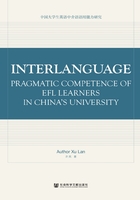
1.6 Definitions of Terms in the Study
The following are the definitions of the key terms in the present research:interlanguage,interlanguage pragmatics,English majors,nationality,level of language proficiency,speech acts,implicature and routines.
(1)Interlanguage:Interlanguage refers to the English language that EFL learners in China acquire in the process of college education,especially for the third year English major students in the Guizhou Province,China. It is the interlanguage between Chinese and English for the Han people,and among minority language,Chinese and English for the ethnic minorities.
(2)Interlanguage Pragmatics:Interlanguage pragmatics concerns the perfor-mance of China’s EFL learners in pragmatics when learning English. It includes three aspects in pragmatics:speech acts,implicature and routines.
(3)Speech acts:The speech acts included in the present research refer to the most frequently used ten speech acts(advice,gratitude,greeting,congratulation,apology,request,compliment,inquiry,refusal and compliment response)in the daily life of the English major college students in China.
(4)Implicature:Implicature refers to conversational implicature in Grice’s(1975)terms,which is the violation of a Gricean maxim and the hearer needs to infer meaning beyond the literal meaning of the utterance by using background knowledge and the context(Rover,2008). It includes both idiosyncratic implicature and formulaic implicature.
(5)Routines:Routines refer to the customized use of the English language by native speakers in conversations. Both situational routines,as the utterances in making calls,giving responses to congratulations,serving a customer in a shop,and functional routines,such as the utterances in request,inquiry,greeting,suggestion,and other speech acts,are included.
(6)English majors:English majors are the students who have learnt English for about six years in middle schools of China and have entered a China’s university to study the English major program for the third year. Hence,the population for the present study is the English majors who are pursuing bachelor degrees in the universities of the Guizhou Province.
(7)Nationality:Nationality is a variable which is assumed to have an influence on ILP competence. Nationality refers to the Han and ethnic minorities in China,especially in the Guizhou Province. The participants were divided into two groups based on their nationality:Han and ethnic minorities. The Han people are the majority group who represent 92.51% of the population in China(Report of the 6th Census of Population,2011). All the minority students were grouped into one although they came from different ethnic backgrounds,such as Miao,Buyi,Tujia,Shui,Dong,Gelao and so on. Furthermore,the minority students only included those who grew up in the minority districts and whose mother tongues were their minority languages,but not those who grew up in the cities with the Han people and whose first language was Mandarin.
(8)Level of language proficiency:Level of language proficiency refers to the achievement of the English majors in the TEM 4.The students’ level of language proficiency were defined as high,medium and low based on the students’ test scores in TEM 4 in 2014.The students were grouped by their scores,the top one-third were grouped into the high level group,the middle one-third formed the medium level group,and the bottom one-third made up the low level group.